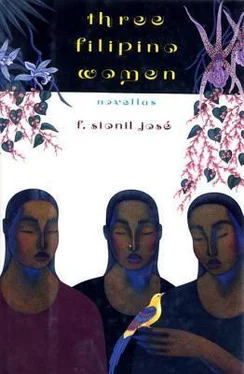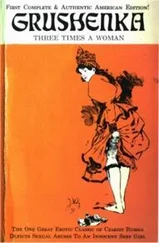Francisco Jose - Three Filipino Women
Здесь есть возможность читать онлайн «Francisco Jose - Three Filipino Women» весь текст электронной книги совершенно бесплатно (целиком полную версию без сокращений). В некоторых случаях можно слушать аудио, скачать через торрент в формате fb2 и присутствует краткое содержание. Год выпуска: 2013, ISBN: 2013, Издательство: Random House Publishing Group, Жанр: Современная проза, на английском языке. Описание произведения, (предисловие) а так же отзывы посетителей доступны на портале библиотеки ЛибКат.
- Название:Three Filipino Women
- Автор:
- Издательство:Random House Publishing Group
- Жанр:
- Год:2013
- ISBN:978-0-307-83028-9
- Рейтинг книги:4 / 5. Голосов: 1
-
Избранное:Добавить в избранное
- Отзывы:
-
Ваша оценка:
- 80
- 1
- 2
- 3
- 4
- 5
Three Filipino Women: краткое содержание, описание и аннотация
Предлагаем к чтению аннотацию, описание, краткое содержание или предисловие (зависит от того, что написал сам автор книги «Three Filipino Women»). Если вы не нашли необходимую информацию о книге — напишите в комментариях, мы постараемся отыскать её.
and
-examine the Philippine experience through the lives of three female characters, a prostitute, a student activist, and a politician.
Three Filipino Women — читать онлайн бесплатно полную книгу (весь текст) целиком
Ниже представлен текст книги, разбитый по страницам. Система сохранения места последней прочитанной страницы, позволяет с удобством читать онлайн бесплатно книгу «Three Filipino Women», без необходимости каждый раз заново искать на чём Вы остановились. Поставьте закладку, и сможете в любой момент перейти на страницу, на которой закончили чтение.
Интервал:
Закладка:
END OF TAPE
I had been thorough in the interviews, of which I conducted literally more than a hundred, and I also visited and revisited the places where Narita had been and which were relevant to this story. I was always welcome in the Forbes Park residence and her two boys called me Tito. I knew their housekeeper, a distant aunt from back home in Santa Ana. It is a Spanish-type house, whitewashed, with a red-tile roof and ornately grilled windows. Tiles all over the place, in the balcony, the kitchen, and the trees planted there — the guava and the pomelo are now bearing fruit. Narita never seemed to have forgotten the old house in Santa Ana. And yes, the cadena de amor scrambles over the walls, not too profusely or wildly.
I had often mused about how it must feel to have someone commit suicide over you. I remember distinctly that afternoon we were having coffee in her library and she reminisced about her marriage to Lopito. I had just finished her major speech on the restructuring of Filipino cultural values and we were as a matter of fact, engaged in a discussion on the subject which had fascinated us in the think tank as well. She could have written it herself but, like me, she had taken up too many chores. By then, she had wanted me to leave the university so that I could be on her staff full-time, but I was never sold on politics as a career and, in hindsight, I was, of course, right.
She was in comfortable jeans, denim jacket, her hair in a ponytail. She was the mother of two but she could have easily been one of the juniors on the campus. She was holding a glass of Campari and soda which she herself had mixed and she had given me a glass of Southern Comfort, an affectation I had picked up in Cambridge. We had the house all to ourselves; the maids were asleep in their quarters, and the boys were vacationing with their grandfather in Baguio. She asked me why, at the very old age of thirty-four — which she also was — I had not yet gotten married.
“I suppose I have always been in love with you,” I said, at which she laughed aloud, that kind of joking, insinuating laughter which meant that while she appreciated the thought, she also automatically rejected it. She was already one of the most popular women in the country and vastly wealthy, the extent of which I had only started to realize.
“Well, at least you are not a homo,” she said, merriment in her eyes. Then it came — sudden, precise, and without any warning. “That was what Lopito was — oh, everyone knew it. Didn’t you?”
I nodded.
“He was what you call AC/DC,” she said, her face all seriousness now. “We had such fun in the beginning when he was going to Santa Ana — remember? And here in Manila, too, when he was parading me around. I was good camouflage for him. But I think that in his own way, he sincerely loved me.” She paused. Her eyes had misted. “He was so kind, so good to me. He did all that I wanted and I promised myself that I would really be true to him, be an old-fashioned Filipino wife. Do you still see the likes of her?”
“Are you asking me as a sociologist?”
“Yes,” she said.
“The society is changing, Narita. Look at you and you understand how times have changed.”
She nodded. “It was not the boys that Lopito brought home,” she said, “although that aggravated it. It was not his putting me on a pedestal to show off to his friends, to his society crowd. I liked that. I had more beauty, more brains than any of them.” Then it all came through again how the girls at Assumption had snubbed her because she had such lowly origins.
“Lopito, we could have been just friends, you know. As two people can be very good friends, the way we are …” She leaned over and pinched me on the thigh. It was more of a caress and it sent delightful shivers through me. “But after we had gotten married, that was when we really had body contact, you know, the kissing and the petting. Man-wife relations. But that was all there was to it. I would be all heated up and anxious and ready — and he could not do it. He could not do it!” She was pounding the throw pillow viciously, her face wrought up in anger, her eyes blazing. I had never seen Narita in such a mood before and I was shocked and frightened.
After Lopito’s death, Narita went into mourning, wore the black dress of widows and — as an informant told me of this period — she was if anything more chic in her black dresses. But her grief was real. You cannot live with a person for five years and not have the slightest attachment to him. She retained her married name and preferred to be addressed as Mrs. Reyes even when she went into politics. And her children, too, though they were not Lopito’s — she gave them her husband’s name. Senator Reyes knew this and it is perhaps for this reason why the Old Man is happy with her children, too.
What would a young, beautiful widow in the Philippines do if she had brains and money as well? The world is wide open and it was at this point that Colonel Antonio Cunio came in. But first, may I point out one basic problem that I also encountered when I started this study.
I had wanted to do a survey of women in politics and we have many examples that date back to the earliest days of suffrage or, if you will, to the revolution against Spain when our women played a vital role. But by zeroing in on a particular subject, a woman I knew very well, I could detail the personal incidents, pry into motivation — all of which cannot be quantified, but which are important in any study. This would, probably, be termed as psychohistory or psychosociology. But I am not one to bother the general reader with obtuse jargon that is often the mumbo jumbo of muddled thinking or which is simply bad writing.
At first, Colonel Cunio, who is now retired, did not want to talk. I had to rely on the usual tricks of the interviewer to thaw out his reserve. I told him that I need not mention his name in the study but afterwards, he gave me blanket authority to use all the “facts” with his name if I wanted to.
As it turned out, he was loquacious, proud of his Korean War record, proud of his machismo.
All that he described happened during the time I was at Cambridge. I had not seen Narita since I left for the United States although in my third year there, I learned that she was in New York. Colonel Cunio was a Philippine Military Academy graduate; he prided himself on his knowledge of Philippine politics and grudgingly admitted that Narita was bright, particularly when she analyzed the Far East. “I don’t know where she got that smattering of Japanese,” he said wryly, “but when she started talking about periods in Japanese history, and Korea, too, she really had the field to herself.”
TAPE TWO
Colonel Antonio Cunio, retired:
I got my commission in 1947 and that same year, I commanded a platoon in the Huk campaign in Central Luzon. I was a junior at the PMA during the war and could have gotten my commission in the field … Nothing spectacular about World War II; we were disbanded in Cagayan and there was some guerrilla work. I was in several operations, including Four Roses — that was when William Pomeroy, the American communist, was captured. I also saw action in the Korean War, I suppose you have read about that although you may have been quite young then. Our battalion figured in the Imjin campaign and that was where I got this Distinguished Service medal. Well, actually, it was a retreat, for the Chinese were coming at us wave after wave and I led a company through a pincer movement. We lost five in that encounter, but I can assure you the Chinese lost many more. They were so close, we were fighting with fixed bayonets. We did no hand-to-hand fighting, but we were lobbing grenades. The barrels of the automatic rifles were hot and still they came, blowing their bugles. I had a flesh wound in the thigh — I did not even know it till one of the men pointed to my bleeding leg and they bandaged it to stop the flow. I was weak but you can rely on this old Tagalog blood to carry me through.
Читать дальшеИнтервал:
Закладка:
Похожие книги на «Three Filipino Women»
Представляем Вашему вниманию похожие книги на «Three Filipino Women» списком для выбора. Мы отобрали схожую по названию и смыслу литературу в надежде предоставить читателям больше вариантов отыскать новые, интересные, ещё непрочитанные произведения.
Обсуждение, отзывы о книге «Three Filipino Women» и просто собственные мнения читателей. Оставьте ваши комментарии, напишите, что Вы думаете о произведении, его смысле или главных героях. Укажите что конкретно понравилось, а что нет, и почему Вы так считаете.












